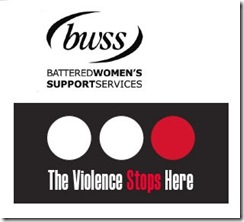Battered Women Arrests and Police Complaints – We Must Remain Vigilant
By Angela Marie MacDougall
Since 2008, Battered Women’s Support Services (BWSS) has been supporting a growing number of women accessing our services who have been arrested for allegedly perpetrating domestic violence against their partners. In our experience, these arrests are occurring despite the fact that in all cases the women were in relationships where their partners were abusing them.
In 2010, we participated in several meetings with the Royal Canadian Mounted Police/"E" Division Crime Prevention and Program Support Services, NCO I/C Program Support and Evaluation. RCMP "E" Division Crime Prevention and Program Support Services are in the process of making a number of changes to policy and procedures related to how they conduct domestic violence investigations. BWSS participated in the external consultation phase.
The consultation included:
1. Revisions to the "E" Division Violence in Relationships Policy.
2. Newly developed Domestic Violence Unit Policy.
3. The introduction of an Investigation Guide and Supervisor Quality Assurance form to replace the current ED 301 and 301-1 Domestic Violence check sheets.
Some results have been observed from these consultations, however, we are remaining vigilant as several recommendations we deemed essential to women’s safety within the policy and practice revisions were left on the table by RCMP, specifically issues arising from women arrests. Further, BWSS has been challenged by a larger provincial agenda emphasizing “dual arrest” overshadowing the reality of women arrest. Though there are instances of “dual arrest”, when both parties are arrested, which is also a concern, the policy development with a “dual arrest” emphasis has shifted the focus from the larger concern of increasing numbers and the chain of causation for women being arrested.
Presently in 2011:
- BWSS is working with 28 cases where women have been arrested and our support and advocacy has involved a variety of strategies all dependent on the direction and guidance of each individual woman involved.
- As co-complainant with women who have been arrested, BWSS filed three police complaints with the Office for Public Complaints Against the Royal Canadian Mounted Police (RCMP).
- Two of the three complaints have been resolved successfully; the third is currently under review.
- In the two resolved complaints the RCMP acknowledged the police officers failed to follow several areas the Violence In Relationships (VIR) Violence Against Women In Relationships (VAWIR) Policy (the policy guiding their policing response in domestic violence cases) and failed to follow E” Division Operational Manual relating to Victim Service Programs and wrongfully arrested the battered women.
- BWSS is currently preparing a fourth police complaint as co-complainant.
- One RCMP jurisdiction has stood out with more wrongful arrests than any other in BC, BWSS has met with and we are in ongoing conversation with their leadership. There is another very close second RCMP jurisdiction where we are working our way to engage the leadership there, too.
Many women who are being arrested are recent immigrants who speak little or no English. - BWSS has recently become aware that in the Okanagan there has been a spike in Immigrant women being arrested. We are currently seeking more information in order to ensure the women who been arrested in that region receive support and advocacy.
- December 2010, Public Safety and Solicitor General, Attorney General, and Children and Family Development issued an updated Violence Against Women in Relationships Policy (VAWIR) which included “Police Release Guidelines” appendix updating the guidelines for municipal police and RCMP that were originally developed in 2005.
As we wrote in 2010, there are huge legal, social, economic and emotional consequences for women who are arrested, which may include:
• exclusion from transition houses and victim services programs (community and police based),
• involvement of MCFD,
• loss of child custody to a violent partner,
• the inability to find employment with a criminal conviction,
• incarceration,
• deportation and
• simply falling thru the cracks of a shrinking women’s safety network.
These consequences add significantly to the burden already being shouldered by women who are dealing with the emotional, physical and spiritual impact of being a victim of relationship violence. Further, women’s negative experience of the criminal justice system may in many cases increase vulnerability for further abuse.
We must remain vigilant, given the increasing prevalence of woman arrest, the provincial emphasis on “dual arrest” and the dire consequences of being arrested, it is critical that advocates are proactive in assisting women who have been arrested. Women who are arrested should be provided with appropriate information, support and advocacy. Our toolkit When Battered Women are Arrested is available on our website. We have appreciated the positive feedback from advocates and women who have found it useful.






I am a retired senior police officer from England with a significant experience in Learning and Development. Reading your web-site (I got sent one of your Tweets) I think I could be of help.
I am a Domestic Violence trainer for Surrey County Council delivering to the full range of council staff.
I have taught domestic violence to UK Police Officers at both Police Colleges and also at Canterbury University.
If my experience can be of any help to you in developing or delivering training to and for the RCMP I would be delighted to help.
Please contact me if there is anything I can do.
Phil Waters